Bruce Robinson on why he’s re-writing Withnail and I
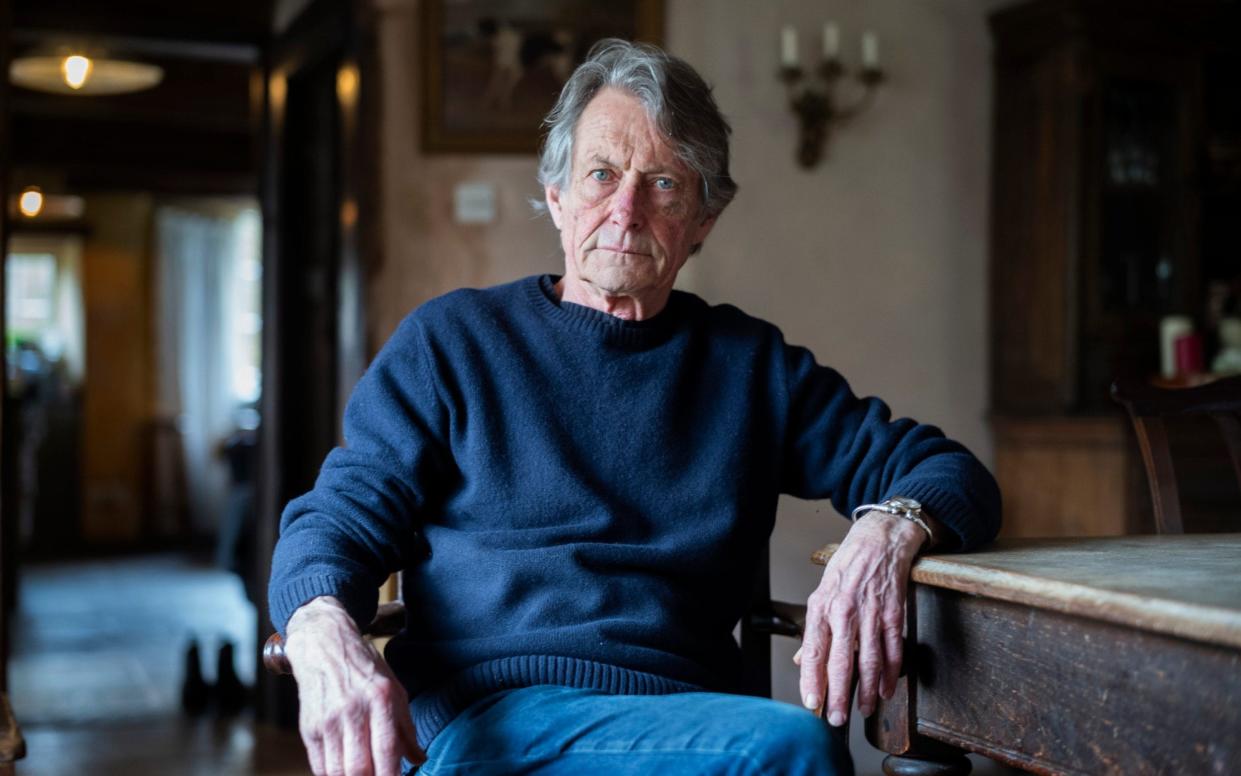
- Oops!Something went wrong.Please try again later.
- Oops!Something went wrong.Please try again later.
- Oops!Something went wrong.Please try again later.
Bruce Robinson is furious. The Oscar-nominated screenwriter of The Killing Fields and the writer-director of Withnail and I has been comparing the outsized salaries of water-company bosses to the fate of Birmingham Rep, which has just had its funding cut to zero. “It’s a fabulous theatre, and they’re getting absolutely nothing. We have to ask ourselves, as English people, what would you rather have? A guy pouring s--- into our rivers for a million quid?”
Even when he’s raging, Robinson is funny (“If you and I went down to Westminster Bridge and s--- over the bridge, we’d be arrested. Find ourselves in Bow Street: ‘What’s the charge?’ ‘Putting s--- in the river’”). But it’s an issue that’s close to home. Birmingham Rep is about to put on the first ever stage production of Withnail and I. And its 77-year-old creator has lived for the past three decades with his wife, the artist Sophie Windham, in a 16th-century farmhouse in Herefordshire, just a couple of miles from the River Wye.
“It was exquisitely beautiful when we moved here, full of salmon. Go down there now, and I do not exaggerate, the only thing you’re gonna see in this brown water is salmon on their backs, kingfishers dead, floating by in all this s---. It’s outrageous. We used to take the kids, my son Willow and my daughter Lily, down to the Wye and they would swim in it… It really bothers me obsessively.”
Robinson lays the blame on the sale of the water authorities in 1989. “Big corporations in China own [much of] the Thames. We’re haemorrhaging money out of our country.” He adds: “I’m not Left, Right or anything. I’m just for realism.” Still, he gets annoyed at any politician claiming that “Britain leads the world” – “We don’t. We’ve sold everything. Jaguar’s an Indian car. MG’s Chinese, Bentley’s German, Rolls-Royce is German. Lead the world in what?
“One thing we do lead the world in is our arts. Christ, how many little countries like England could have produced the Stones and the Beatles and the Kinks, and world-leading theatre, writing, movies. It’s a very talented country.”
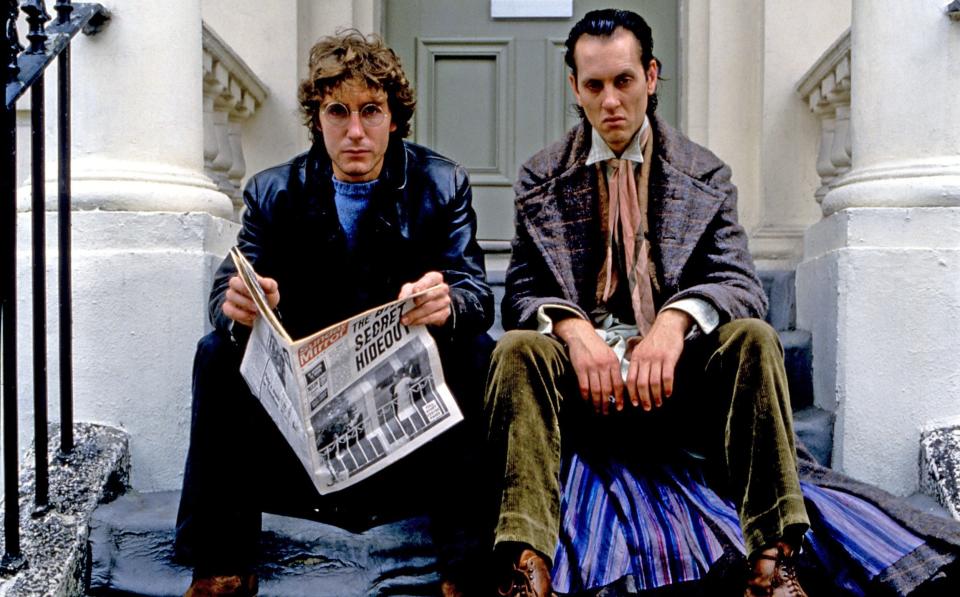
Not all of his memories of the Stones are as glowing. As a young actor, fresh out of drama school, and in a 1968 play at the Royal Court with Marianne Faithfull, who was dating the frontman, he recalls, “Mick used to come in all the time. I got on really well with him, but I remember standing in the p---ing rain on the King’s Road at a bus stop, and here comes this blue Aston Martin… it’s Mick in his new car.” He mimes the drenched little wave he gave Jagger – “thinking I was going to get a lift” – as the singer waved back and drove on. “That tells the tale, doesn’t it,” he says, “put me in my place.”
Around this time, Robinson was living with friends in Camden Town, a scenario that would evolve into his masterpiece, Withnail and I. “There was a whole conurbation of kids living in this house that was owned by David Dundas [the songwriter who later had a top-three hit with Jeans On]. David was infinitely richer than us. So many of us moved in, he couldn’t bear it any more, so he left the house to all us w-----s.” They sat around drinking wine and smoking pot, getting by on almost nothing (“I was on the bins for a bit in Camden, got about six quid a week”), but one by one, their careers took them elsewhere, until there were “two people in the house left”.
These were Robinson and Vivian MacKerrell, the model for the on-screen Withnail, a not-talented actor with a classical education and a problem with alcohol that would lead to his early death. “He had tinted glasses – he couldn’t see a thing – he wore this blue suit, and he was very good-looking.” Just hearing Robinson tell stories about MacKerrell is to hear the voice of Richard E Grant as Withnail in the 1987 film. “Viv was charming, that was his genius. He used to say to me...,” he starts to laugh, “he’d say, ‘If I wrote – if I wrote – I’d just write the arse off you any day of the week.’ And I used to say – ‘Viv, my Olivetti is on the kitchen table…’ ‘Oh, f--- that! But if I did write, I’d be an infinitely better writer than you.’”
That would have meant competing with one of the most quotable comedies ever written – from Withnail’s “We’ve gone on holiday by mistake!” to drug dealer Danny’s dire warning, “If I spike you, you’ll know you’ve been spoken to.” For the Birmingham stage, Robinson has adapted his tale of two out-of-work actors from Camden on a booze-filled bender in the countryside as faithfully as possible (Robert Sheehan takes Grant’s role of Withnail, Adonis Siddique is Marwood, played by Paul McGann in the film), although he has added a new line about alcohol sending in “an evil f---ing invoice”. “I want the dialogue to stay pretty well the same,” he tells me, “it’s pretty sacred to me and I think to fans of the film,” although he accepts that a few of-their-time lines may not make it. “Who’s the huge spade in the bath?”, for instance – “That was the language of the day. If they decide that that is insulting, by all means take it out.”
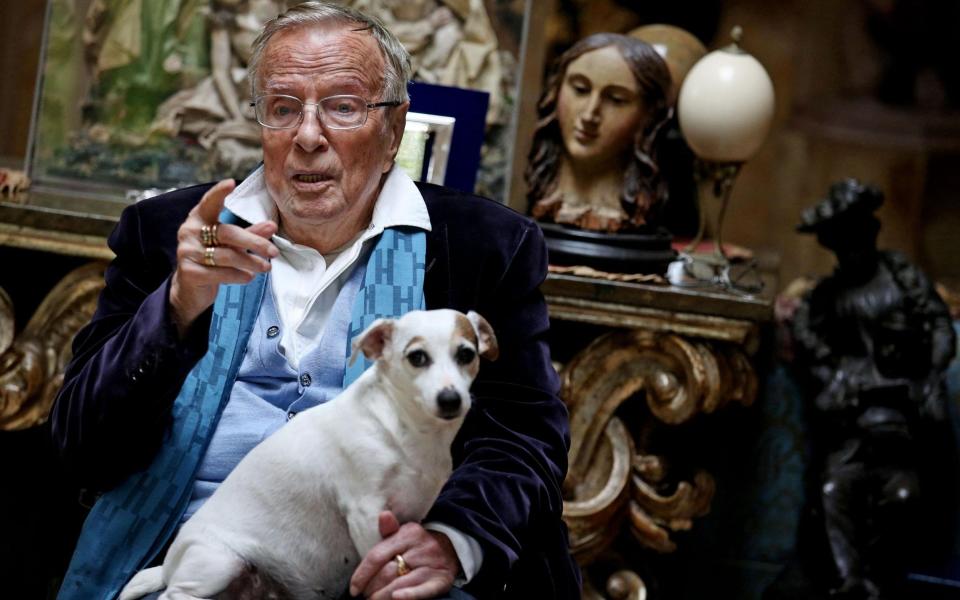
It has also been suggested that Withnail’s Uncle Monty, a somewhat predatory gay man, played in the film by Richard Griffiths, is homophobic, yet he is in many ways the most sympathetic character of the piece and gets many of its best lines, such as, “It is the most shattering experience of a young man’s life when one morning he awakes and quite reasonably says to himself, ‘I will never play the Dane.’”
Robinson tried to write Monty as someone who had been tricked, and was a victim, he says. It’s well known that the character is partly inspired by the author’s experiences as a young actor on the film Romeo and Juliet (1968) with the Italian director Franco Zeffirelli, whom he recalled arriving when he was in the shower, offering to dry his hair, soon to be followed by “the tongue down my throat. And worse.
“He was genuinely appalling to me, Zeffirelli,” he says now, “sadistic to me.” There are uncomfortable similarities to the experiences of Harvey Weinstein’s victims. “It’s a cliché, isn’t it, the casting couch, but that didn’t come from nowhere. I think powerful film directors would kind of de rigueur take the girls to bed. But it’s an iniquitous thing to do; actors are so vulnerable, anyway. When I was a young actor, it wasn’t uncommon at all to get hit on by, in my case, homosexual directors expecting you to play the game… Women,” he notes, “had a terrible time inside this industry until the MeToo thing happened, which put the brakes on that.”
As for Weinstein, “The right place to be is in prison for a man like him. How dare he do that. Even if I was Cecil B DeMille, I can’t imagine doing that. You know, if a beautiful, sexy girl came around to design the inside of your house, you didn’t expect her to f--- you? But in the film world, a pretty girl comes in and she’s up for grabs? It’s horrible.”
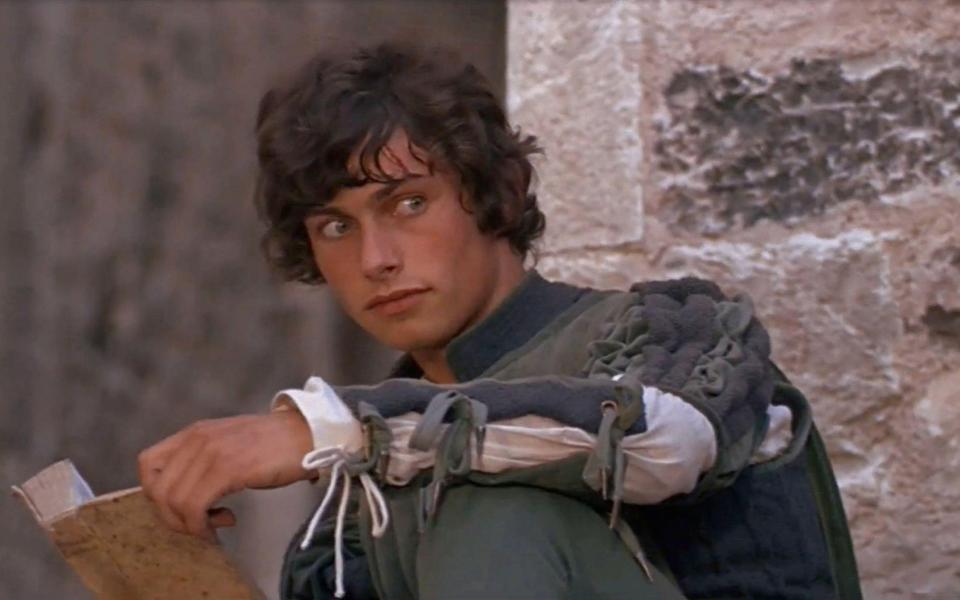
We’re in the comfortable living room of the farmhouse, taking an armchair view of the world. Robinson’s sipping zero-alcohol Guinness. “I’m an alcoholic,” he says plainly. “I’ve used alcohol all my life – thank God, only red wine – to suppress what Wordsworth called ‘Thoughts that do often lie too deep for tears’.” He’s talking about his unhappy childhood on the Kent coast, where the man he called Dad treated him cruelly. His mother had had an affair with an American serviceman while her husband was away serving in North Africa, and Bruce was the result. His stepfather couldn’t accept it. “I remember I was about four, running up the hallway where we lived, because he’d come through the door, and he punched me in the face, and I tumbled backwards down the hall. That was the beginning of the horror. He used to carry a riding crop; he didn’t have a horse, but, Christ, he used to lay into me with it if I did anything offensive.”
As a child, Robinson was told he was stupid, and was sent to the local secondary modern. “My mother was too guilty to show interest and he was too hurt, and it was just awful. I feel retrospectively incredibly sorry for him. They were dark days, the 1940s and 1950s, and there was no love between them. And I guess I was the walking representative of her guilt, you know, every time she looked at me, she thought, ‘Oh, Christ, that’s ruined my life.’ And he would, I suppose, feel the same thing.”
Many years later, Robinson would discover that in peacetime his biological father was a Manhattan lawyer, and he met his half siblings. “It was too late in the day,” he says now. He has, however, been able to get control of his boozing, which he says used to help him write at 80mph. He freely admits to having an addictive personality. He lived in Los Angeles in the 1980s, and recalls, “It was an extraordinary time, because the whole city was awash with cocaine. You’d go and see your lawyer and he’d put out a couple of lines on the desk.”
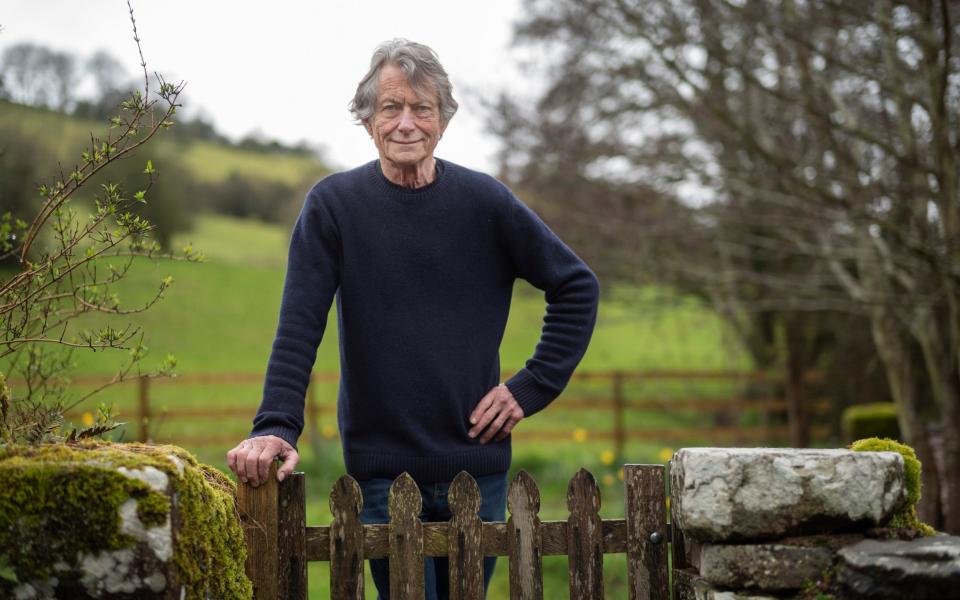
He recalls George Harrison, one of the founders of Handmade Films, which produced Withnail, picking him up at his LA hotel to go to “a concert” with him – it turned out to be Bob Dylan. “He’s a total hero of mine. George introduced me to Dylan, who, let’s say, was somewhat squiffy. I remember writing down a note that night, ‘handshake like a partially excited penis’. We were in the dressing room, and some of the most famous people in Hollywood were in there doing the business.” Coke, he adds, was “endemic in the film industry. But when my daughter was born, that was it for drugs for me – just I’m a dad now, and I’ve got this vulnerable little creature in my life. And I literally cut out any drug, and I’ve never had any since. We’re all like Presbyterian monks now compared to what it was like.” He mentions his clean-living musician son, Willow, who is recording at the farmhouse with his Alabama-born wife Mary, as the duo Outpost Drive.
He points out a large painting of Keith Richards on the far wall. “That’s by Johnny Depp,” he says. “It’s painted on fag papers. He’s a very good painter, the Depp.” The two go back a while. When Robinson became disillusioned with the “awful, horrible” way he was treated by Hollywood producers while making the 1992 thriller Jennifer 8, he vowed never to direct again. It wasn’t until two decades later that he was lured back by Depp to write and direct an adaptation of Hunter S Thompson’s The Rum Diary, in which the then 45-year-old actor began filming alongside a relatively unknown 22-year-old actress.
“The weird thing for me was I introduced him to Amber Heard,” Robinson says. “I mean, the stuff that was printed about Johnny is just bulls---. I’m sure there was a lot of friction in their relationship, but some of the things that were said about him are just utter nonsense. He’s one of the most genuinely nice people I’ve ever met; I’ve never met anyone who’s as generous as Johnny – yes, he’s got lots of money, but I’ve met lots of people with lots of money who aren’t necessarily generous. He was all over the British press like he was the wife-beating monster. It was hideous.”
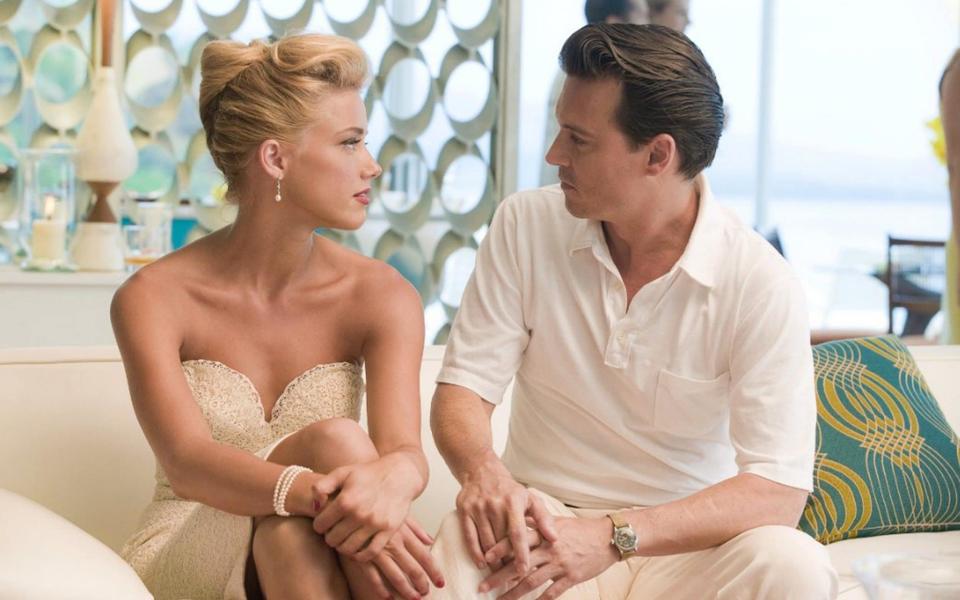
In 2020, Depp lost his case against The Sun in the UK, after the paper labelled him thus, as a “wife beater”. But two years later in the US, Depp won a defamation suit against Heard, over an op-ed she’d written for the Washington Post. “They’re both pretty volatile personalities,” Robinson says. “I liked her. She’s very intelligent. It just wasn’t made in heaven.” He explains how a film set provides an artificial setting for an intense relationship with the other actors, “and then, suddenly, it’s gone. It’s dust.” The couple, he suggests, carried the intensity of their relationship into the real world. “It was kind of tragic that it ended up like it did,” he says. Still, what Heard wrote about Depp, he claims, was “total bulls--- … and he couldn’t accept it”.
Meanwhile, Robinson devoted 10 years of his life to solving the mystery of Jack the Ripper. His wildly entertaining 864-page They All Love Jack (2015), which named the killer as Michael Maybrick, is in many ways a dissection of a cover-up, perpetrated he believes by a network of freemasons. Robinson’s voluminous library of research materials, such as the fraying, leatherbound police order books for the East End of London – “they’re like gold dust” – is housed, floor to ceiling, in his converted-barn workroom. Can he really be sure he’s got his man? “I’d bet my life on it. I really would.”
Robinson is a natural storyteller who one senses could run long into the night, as he used to while smoking pot with his friend MacKerrell – “For two years, we sat there talking, literally two years.” But his beloved cairn terrier, Roubles, is following him around wondering when he’s going to make her tea. He has not been to a play rehearsal yet. “I don’t want to stick my nose in – there’s a director and there are actors, and they’ve got to do it. I would probably try and replicate what I did. I’d be looking for a Richard E Grant –he is really weird, Richard, I adore him, [but] he can be very acerbic or an absolute Walt Disney delight –and a Paul McGann and a Richard Griffiths. If they’re very good actors, Uncle Monty could be played by a really short, thin man,” he adds.
“I mean, honestly, when I was sitting at that kitchen table writing Withnail, in 1969, 1970, if someone had said to me, ‘do you realise that we’ll still be talking about this in 50 years’, it’d be insane. Insane.”
Withnail and I is at Birmingham Rep (birmingham-rep.co.uk), May 3-25

